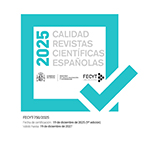Reavaliação da Obra de José Rodrigues Miguéis, Léah e Outras Histórias: Contos de Tradição e de Vivências
Resumen
En Léah e Outras Histórias, José Rodrigues Miguéis hace una crítica severa analizando la situación político-social del Portugal del siglo XX. Queda en evidencia que su exilio a los Estados Unidos en 1935, durante la dictadura de Salazar, no lo separó de la problemática portuguesa, sino que por el contrario, hizo que sus inquietudes se hicieran más latentes como escritor, mientras comparaba la democracia americana a la situación política en Portugal. En los cuentos de su colección Léah e Outras Histórias, Miguéis examina los diferentes choques culturales de sus protagonistas portugueses y los personajes que los rodean, reflejando estas diferencias en experiencias cotidianas, tales como enamorarse, ir al barbero, pasear por una gran avenida de Nueva York, entablar conversaciones con vecinos u otros inmigrantes. Este estudio comenzará haciendo una pequeña introducción de la evolución del cuento como género narrativo en la historia de la literatura portuguesa. Se procederá a hacer un análisis de las narrativas en Leah e Outras Histórias como siendo reflejo de la complicada situación causada por las diferencias culturales vividas por el inmigrante o el exiliado. Se analizaran los enfrentamientos sociales o lingüísticos a los que se ven expuestos los individuos exiliados y cuáles son los mecanismos literarios utilizados por Miguéis para denunciar los distintos traumas. Veremos como el exilio físico de ciertos personajes se convierte también en exilio psicológico por la dificultad de adaptación a lo desconocido. Examinaremos como la tradición cultural portuguesa se contrasta con nuevas realidades sociales y como los problemas de interacción cultural son argumentados en estas narrativas. Mediante la creación de personajes complejos, José Rodrigues Miguéis es capaz de retratarnos de manera realista, los conflictos internos causados por la experiencia del exilio, y demuestra con ironía y sutileza como estos conflictos individuales son en el fondo universales.Descargas
Descarga artículo
Licencia
La Revista de Filología Románica, para fomentar el intercambio global del conocimiento, facilita el acceso sin restricciones a sus contenidos desde el momento de su publicación en la presente edición electrónica, y por eso es una revista de acceso abierto. Los originales publicados en esta revista son propiedad de la Universidad Complutense de Madrid y es obligatorio citar su procedencia en cualquier reproducción total o parcial. Todos los contenidos se distribuyen bajo una licencia de uso y distribución Creative Commons Reconocimiento 4.0 (CC BY 4.0). Esta circunstancia ha de hacerse constar expresamente de esta forma cuando sea necesario. Puede consultar la versión informativa y el texto legal de la licencia.










